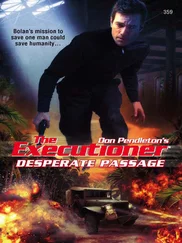Итан Рарик - Desperate Passage
Здесь есть возможность читать онлайн «Итан Рарик - Desperate Passage» весь текст электронной книги совершенно бесплатно (целиком полную версию без сокращений). В некоторых случаях можно слушать аудио, скачать через торрент в формате fb2 и присутствует краткое содержание. Жанр: Путешествия и география, на английском языке. Описание произведения, (предисловие) а так же отзывы посетителей доступны на портале библиотеки ЛибКат.
- Название:Desperate Passage
- Автор:
- Жанр:
- Год:неизвестен
- ISBN:нет данных
- Рейтинг книги:4 / 5. Голосов: 1
-
Избранное:Добавить в избранное
- Отзывы:
-
Ваша оценка:
- 80
- 1
- 2
- 3
- 4
- 5
Desperate Passage: краткое содержание, описание и аннотация
Предлагаем к чтению аннотацию, описание, краткое содержание или предисловие (зависит от того, что написал сам автор книги «Desperate Passage»). Если вы не нашли необходимую информацию о книге — напишите в комментариях, мы постараемся отыскать её.
Desperate Passage — читать онлайн бесплатно полную книгу (весь текст) целиком
Ниже представлен текст книги, разбитый по страницам. Система сохранения места последней прочитанной страницы, позволяет с удобством читать онлайн бесплатно книгу «Desperate Passage», без необходимости каждый раз заново искать на чём Вы остановились. Поставьте закладку, и сможете в любой момент перейти на страницу, на которой закончили чтение.
Интервал:
Закладка:
HASTINGS LEFT SUTTER'S FORT on April 11, a month before the Donners and the Reeds jumped off from Independence. He gathered a small party and started over the Sierra, intending to travel his proposed cut-off backwards, from west to east, and then to await the emigration on the main trail. As the wagons rolled up, he would recruit them for California.
Joining Hastings was James Clyman, who lent extraordinary experience to the group. Born in Virginia little more than a decade after the Revolutionary War, Clyman grew up on land owned by George Washington, from whom Clyman's father leased a parcel. As a young man he went west as a fur trapper, distinguishing himself with displays of ingenuity and determination. He completed, for example, the first known circumnavigation of the Great Salt Lake. In 1827 he returned east to take up business in Wisconsin and Illinois, but nearly two decades later, in 1844, he decided once again to go west. He was almost fifty, perhaps looking for a better climate or perhaps just seeking a little of the old adventurous spirit of his youth, a nineteenth-century version of a midlife crisis. He went first to Oregon, then the next year to California, and by the spring of 1846 was ready to return home. Wisely choosing not to make the trip alone, he joined up with Hastings.
From the beginning, the old explorer doubted the feasibility of Hastings's proposed cut-off—"my beleef is that it [is] verry little nearer and not so good a road as that by fort Hall," Clyman recorded in his journal—and the farther they went the more his apprehension deepened.
By the time he stood amid the desiccated bleakness of the Great Salt Lake Desert, Clyman was awestruck by the lifeless vista. "In fact this is the [most] desolate countiy perhaps on the whole globe," he wrote in his journal, "there not being one spear of vegitation and of course no kind of animal can subsist." At the lake itself, he looked about and recorded simply that he was surrounded by "wide spread Sterility."
When Hastings and Clyman and the others of their little party at last completed the cut-off and rejoined the traditional trail, Hastings stopped to wait for the approaching emigrants, but Clyman kept on going, encountering one wagon train after another coming from the other direction. By extraordinary chance, he found an old friend—James Reed. Fourteen years earlier, Clyman and Reed had served together in the Black Hawk War, when the Sauk and Fox Indians tried to reclaim their tribal lands from white settlers and were massacred by U.S. troops. Clyman and Reed mustered in as members of Capt. Jacob M. Early's Company of Mounted Volunteers on the same day, along with another unknown private, Abraham Lincoln. "We didn't think much then about his ever being
President of the United States," Clyman wrote decades later, after Lincoln's assassination.
At Fort Laramie, the two old friends talked late into the night, Reed questioning Clyman about what lay ahead on the trail, Clyman trying to warn Reed about the desolation he had just seen in the Great Salt Lake Desert. Remembering the conversation years later, Clyman said he told Reed to "take the regular wagon track, and never leave it—it is barely possible to get through if you follow it, and it may be impossible if you don't."
"There is a nigher route," Reed replied, insistently, "and it is of no use to take so much of a roundabout course." Clyman acknowledged that the Hastings Cut-Off might be straighter, but again warned his old friend that it might also be impassable.
Clyman was a rare combination, half southern gentleman, half mountain man. "Deliberate in all his movements," as one contemporary remembered, he was kind and well read, and his voice still held the syrupy tincture of an antebellum upbringing. But he was also an old denizen of the West, a man with hair that reached his shoulders and a forest of whiskers and a sun-burnished face glazed to the hue of "smoked buckskin." He was the kind of man, in other words, who should have received his due from greenhorn settlers. Some of those at Fort Laramie did listen, changing their plans and following the traditional route, or even striking out for Oregon rather than California. By rights, Reed should have been among those who heeded Clyman's advice. The two men had fought a war together, after all, a shared experience that often creates an unbreakable bond.
But if Clyman's warning resonated at all—a nettling abrasion undermining Reed's former certainty—such doubts were probably washed away two weeks later by another eastbound rider, this one a stranger rather than an old friend. Wales Bonney was traveling by himself all the way from Oregon to Independence—a daring if not foolish venture—and carried with him an impressive token of expertise: a letter from Hastings himself. The two men had met along the eastbound trail, and Hastings had given Bonney the letter to show to emigrants. The missive declared that Hastings would wait for the wagons up ahead and guide them along the new route mentioned in his book.
That must have been exactly what Reed wanted to hear. He had not transformed himself from a fatherless boy into a wealthy and successful man by playing it safe. Nor had he started the journey west intending to avoid risks. Danger was inherent in what they were doing, no matter what route they took. Hastings was even putting himself in jeopardy to prove his new shortcut, guiding the wagons personally over the last and most treacherous portion of the journey. And if Reed considered the relative position of his wagons—near the tail end of the season's migration—he surely must have been encouraged to tiy anything that might save time. So he ignored the sound warnings of his old wartime friend Clyman and began talking to his fellow emigrants about the gamble of a lifetime: an untried shortcut through an unknown wilderness.
ON JULY 19, THE DAY AFTER CROSSING the Continental Divide, the wagons reached a nondescript fork in the road that would soon be given a rather romantic nickname: the Parting of the Ways. To the right lay the branch northwest to Fort Hall, to the left the southwest route toward the Hastings Cut-Off. The next morning, most teamsters steered their oxen to the right, choosing the safety of an established trail. But a few families—the Reeds, the Donner brothers, a few others who had been traveling along in the same general pack of wagons—decided to bank on Hastings's promises. In all, about seventy people waved goodbye to their former companions and took the gentle bend toward the left. Most were upbeat, their spirits buoyed by the prospect of a shortcut that might save precious time. The exception was Tamzene Donner, who was wary. They had never met Hastings, she noted, and yet now they were trusting his word on an issue that might literally decide their fate.
As a practical matter, the split at the Parting of the Ways was the true emergence of the Donner Party. Throughout the first half of the journey, as hundreds of wagons all rolled along the same route, traveling arrangements mutated ceaselessly, families or groups of families combining or withdrawing as the inevitable alliances and frictions developed and changed. Sometimes these changes were not even formally recognized. The Donners and Reeds, for example, had initially joined the Russell Party, which in turn became the Boggs Party when Russell resigned his post and was replaced by former Missouri governor Lilburn Boggs, but it appears likely that along the Sweetwater River, they and some companions broke away from Boggs's leadership and traveled independently, although without any known organization or structure.
But now the small group of wagons turning toward the Hastings shortcut would be on its own, traveling down a spur trail without close company, and so they decided to organize formally. With only a few small changes, the emigrants who veered to the left at the Little Sandy River would be the group that faced the coming ordeal in the mountains. The Donners and the Reeds still formed the core, but other large families would prove just as important in the long run.
Читать дальшеИнтервал:
Закладка:
Похожие книги на «Desperate Passage»
Представляем Вашему вниманию похожие книги на «Desperate Passage» списком для выбора. Мы отобрали схожую по названию и смыслу литературу в надежде предоставить читателям больше вариантов отыскать новые, интересные, ещё непрочитанные произведения.
Обсуждение, отзывы о книге «Desperate Passage» и просто собственные мнения читателей. Оставьте ваши комментарии, напишите, что Вы думаете о произведении, его смысле или главных героях. Укажите что конкретно понравилось, а что нет, и почему Вы так считаете.












